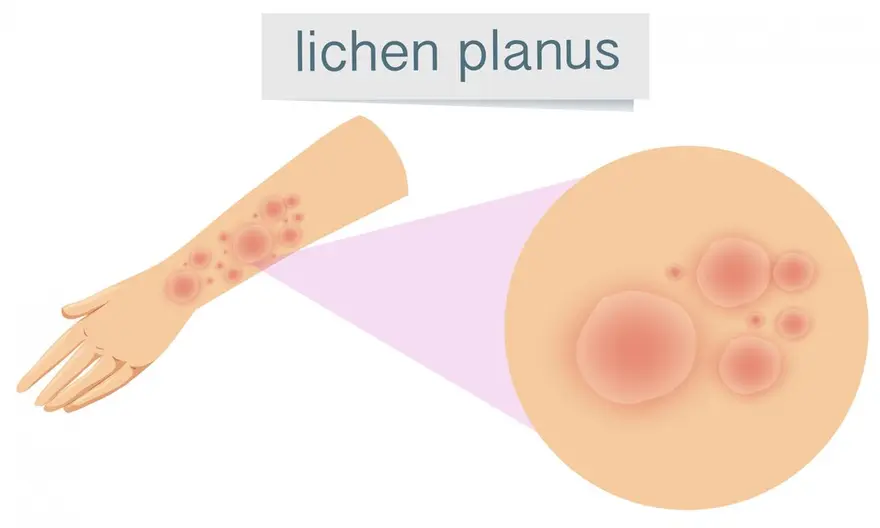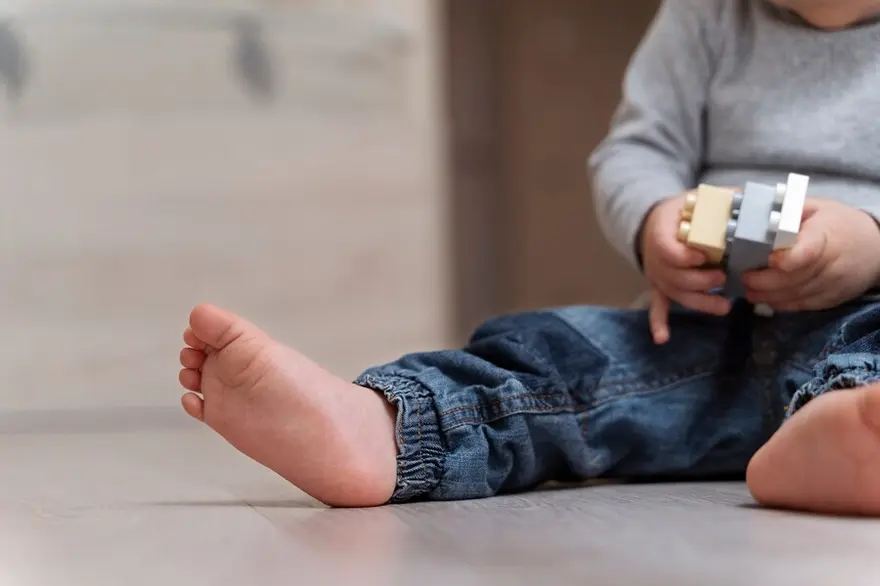Preventive Healthcare
Know About Lichen Planus: Symptoms, Causes, Treatment and Diagnosis
2236 Views
0

What is Lichen Planus?
Lichen planus is a skin disease that leads to body rashes on one or several parts of your body at the same time. This disease can impact you:
- Skin
- The inner side of your mouth (oral mucosa)
- Nails
- Scalp (your body skin covered with hair)
- Genitals (vagina, penis, and vulva)
Is Lichen Planus an Autoimmune Condition?
No, lichen planus is not an autoimmune condition, but it can result in a similar response. In lichen planus, your body's immune system attacks various body parts instead of protecting them from foreign invaders like viruses or bacteria. Consequently, lichen planus causes inflammation of the skin. The exact reason behind this is unknown, though.
What is the Difference Between Lichen Planus and Lichen Sclerosus?
Lichen Planus (LP) and Lichen Sclerosus (LS) are both idiopathic (cause is unknown) conditions. The primary difference between LP and LS is LP usually affects your mucus membranes, including the mouth, nose etc., while LS usually affects your vulvar and perianal regions.
What's the Difference Between Lichen Planus and Psoriasis?
Both psoriasis and lichen planus are skin diseases that may result in discoloured rashes. However, the fundamental difference between both is psoriasis is scaly and never impacts the inner side of your mouth, unlike lichen planus.
Who Does Lichen Planus Affect?
Anyone can suffer from lichen planus. However, one is more likely to get infected with lichen planus between the age of 30-60 years. Some studies have shown that women can develop this disease in their 60s while men can get it in their 40s.
How Common is Lichen Planus?
Lichen planus usually impacts 0.22-1% of the adult population. However, oral lichen planus affects 1-4% of the world's population.
How Does Lichen Planus Affect My Body?
Lichen planus impacts the skin area of your mouth, elbows, and wrists (flexor surfaces), the back surface of your hands (dorsal surfaces), and the front surface of your lower legs.
The spot-on lichen planus skin will initially appear as a tiny raised dot, which will be like the tip of a pin. Eventually, they will grow up to the size of a pencil width.
What are the Symptoms of Lichen Planus?
The lichen planus symptoms will depend on the area where it is affecting your body. For instance:
- If Lichen Planus has affected your inner forearms, ankles, and wrists, it will be in the form of shiny, purple, flat bumps.
- On your cheeks and tongue, they may appear in the form of lacy white patches.s
- Painful sores in genitals and mouth
What Causes Lichen Planus to Flare Up?
The following conditions may flare up the lichen planus:
- Vaccines
- Hepatitis C
- Medicines to treat arthritis, high blood pressure, and heart disease.
- Spicy, salty, and acidic foods (orange juice, tomatoes) can also flare up lichen planus.
What are the Types of Lichen Planus?
Below are some common lichen planus types:
- Oral Lichen planus
This infection appears in the form of white sores in your mouth which can either occur alone or can come along with skin lesions.
- Nail Lichen planus
Usually, this type of lichen planus impacts your fingernails rather than toenails. Affected lichen planus nails may appear brown.
- Annular Lichen planus
This lichen planus infection will look like purple circular muscles on the body with raised borders.
Is Lichen Planus Contagious?
No, this disease is not contagious. It does not spread from one infected person to another through unprotected sex or skin-to-skin touch.
Who is at Risk for Lichen Planus?
The disease affects both men and women equally in their middle age i.e., above 40. However, oral lichen planus is more likely to affect women than men.
How is Lichen Planus Diagnosed?
Lichen planus diagnosis is done by considering your lichen planus symptoms, followed by a physical examination. Your healthcare provider will assess the 6Ps to diagnose lichen planus. These 6Ps are:
- Pruritic (itchy lichen planus)
- Planar (Top is flat)
- Polygonal (your rashes contain several sharp angles)
- Purple papules (bumps)
- Plaques (discoloured, raised, patches)
Based on the type of patches or sores you have on your body, your doctor will suggest the line of treatment.
How Do I Get Rid of Lichen Planus?
There is no specific lichen planus treatment. However, here are some of the lichen planus treatments that can relieve your lichen planus symptoms:
- Cream and ointments: Your doctor may recommend corticosteroid creams or ointments to get relief from inflammation.
- Antihistamines: These are drugs that doctors suggest to treat allergic lichen planus symptoms and itchy skin.
- Phototherapy: This lichen planus therapy uses ultraviolet light. These UV rays present in sunlight can treat certain skin diseases, including lichen planus.
Are There Any Home Remedies for Managing Lichen Planus Symptoms?
Yes, there are! Here are some of the lichen planus home remedies:
- Aloe vera: Aloe vera is known to heal wounds and moisturise skin. It can also work on the lichen planus symptoms in your valve or mouth.
- Oatmeal: Oatmeal is rich in gluten, which can give you relief from itchiness. To use it for your lichen planus rashes, you need to grind oatmeal in a grinder or food processor to make a fine powder. Now, mix the powder in warm water to make a sticky and thick paste. Gently apply the paste and cover the rashes. After 10 minutes, you can wipe the cream with a clean towel.
What are the Complications of Lichen Planus?
The complications of lichen planus include discoloured skin, and in some cases of lichen planus, you may develop certain types of cancer in your oesophagus, tongue, vulva, etc.
Conclusion
Lichen planus is a skin disease that can impact your nails and mouth. Your doctor will diagnose the LP condition based on its symptoms. Lichen Planus symptoms include a change in nail colour and tiny white dots inside cheeks, tongue or lips. Your doctor may recommend blood tests like hepatitis C to check health issues related to lichen planus. So, book your blood sample slot with Metropolis Lab, a leading pathology that offers home sample collection and has centres all across the country.













1701259759.webp)









 WhatsApp
WhatsApp